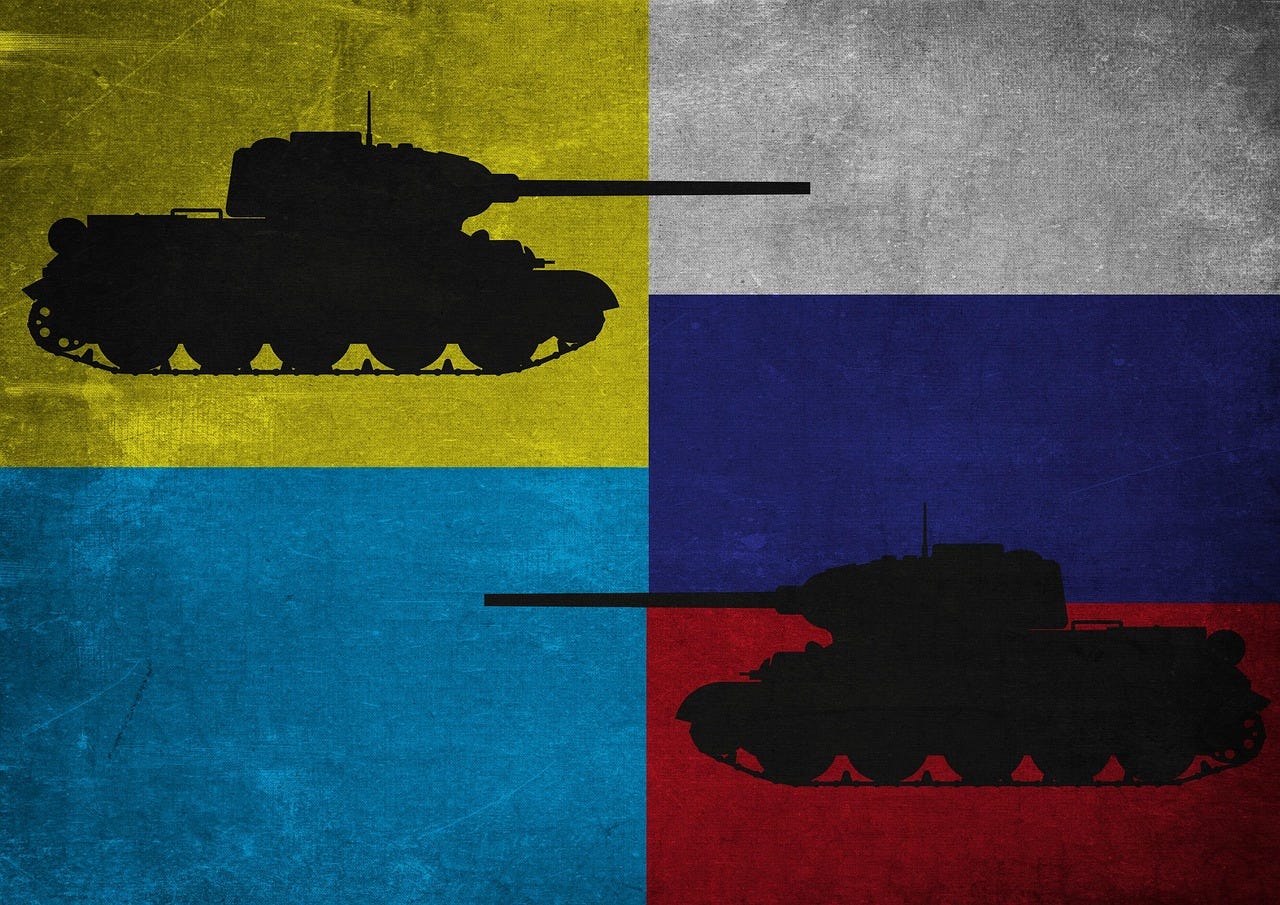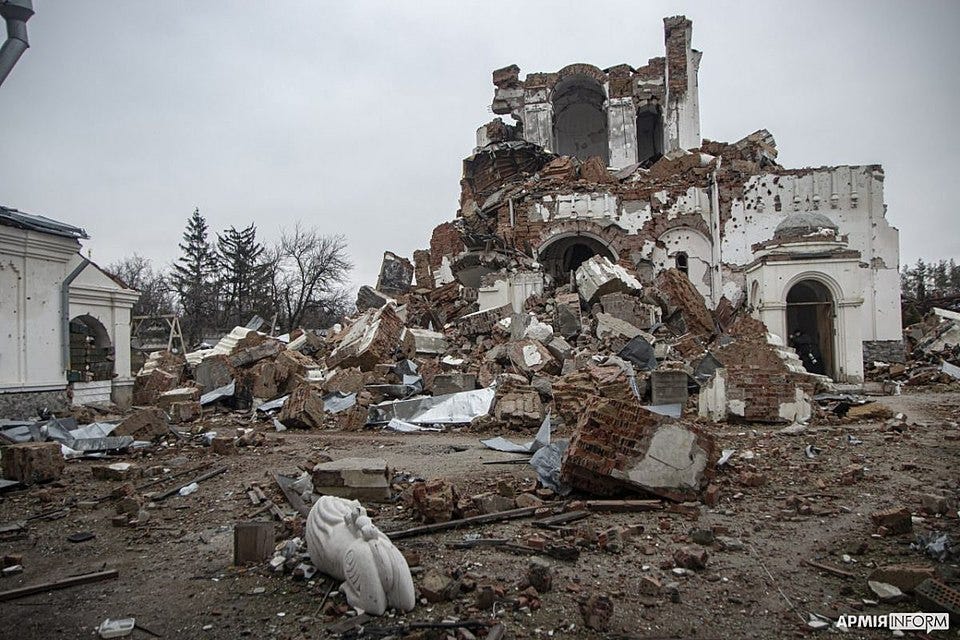
The United States this week presented allies in Paris with its plan to end the war in Ukraine. The plan would be considered a final settlement between Moscow and Kyiv, and the United States is pressing European countries to ease sanctions on Russia in the event of an agreement.
What does this plan involve? A whole lot for Russia and practically nothing for Ukraine.
The parts captured and illegally annexed by Russia would stay under Moscow’s control as part of the US plan, and the conflict would be considered frozen. Ukraine’s NATO aspirations would also be shattered.
In return for stopping the bloodshed, Russia would see sanctions relief.
What does Ukraine get?
It doesn’t sound like Ukraine would get anything other than maybe a reduction in indiscriminate attacks on civilians… maybe. The recent increase in Russian attacks, murders, and destruction of Ukraine’s infrastructure and civilians is almost certainly part of Moscow’s plan to pretend that it is “magnanimously” stopping its attacks—reducing violence from a higher level—in exchange for sanctions relief. Compared with the recent uptick in murders of children, other innocents, and first responders, a reduction in violence would certainly look like Russia is doing something to “earn” sanctions relief.
In addition, people in the know report that NATO membership would also not be on the table for Ukraine. What kind of security guarantees can be offered to Ukraine if it cannot avail itself of NATO’s Article 5?
This proposal certainly sounds like it benefits the Russian side, with nothing for Ukraine, which is the victim of Russian attacks, whose thousands of children were kidnapped by Vladimir Putin, and whose cities, churches, hospitals, and energy infrastructure have been systematically destroyed by Russia during the last three years.

Will Europe agree? What will this mean for firms operating there?
Short answer: I doubt it.
Ending sanctions and other restrictions on Russia, such as unfreezing immobilized assets, requires approval of all member states. I doubt the Baltics or Poland or Finland or Sweden or any host of other countries will agree.
I doubt the UK will go for it either. A few weeks ago, British PM Starmer actually said that sanctions should be increased against Russia, and that Putin was “playing games.” He claimed that sanctions should not be weakened, but rather “now is the time to increase sanctions to get them to the table.”
Chances are, sanctions will remain, and so will the risks.
Any multinational company transacting in the EU or the UK—regardless of whether the United States bows to Putin’s sanctions relief demands—still risks violating sanctions. Yes, I realize that the dollar is still the world’s reserve currency and that the risks are very much tied to the United States and our sanctions regime. But the United States recently extended the national emergency under which sanctions may be imposed against individuals and entities furthering specified Russian harmful foreign activities for another year pursuant to Executive Order (EO) 14024.
That means that any individual or entity sanctioned under EO 14024 is still considered part of Russia’s military-industrial base. That also means that pursuant to EO 14114, all of them (thousands at last count) are subject to secondary sanctions risk. The regulatory risk, not to mention potential reputational damage of being known as a company or individual helping Russia murder civilians by transacting with its military-industrial sector is not insignificant.
In addition, the EU and the UK have been focusing on enforcement, and the risks for companies—both reputational and regulatory—that transact internationally are very real.
The UK’s Office of Financial Sanctions Implementation (OFSI) last month fined Herbert Smith Freehills CIS LLP £465,000 for violating UK sanctions. The penalty was in relation to six payments the firm made to designated entities Alfa-Bank, Sovcombank, and Sberbank. I note that the company voluntarily disclosed the sanctions violations worth nearly £4 million to OFSI, and therefore earned a 50 percent reduction in its penalty amount.
The EU last year implemented new rules to harmonize criminal offenses and penalties for sanctions violations. The new rules aim to ensure that violations of EU restrictive measures can be criminally investigated and prosecuted in all Member States. The list of criminal offenses includes failing to freeze assets; violating travel bans and arms embargoes; and providing prohibited or restricted economic and financial services, including transferring funds that should be frozen to a third party, or providing false information to conceal funds that should be frozen.
Denmark last month introduced legislation to increase penalties for violating sanctions against Russia. The proposed bill will increase the penalty range for violations from imprisonment of up to 4 months to imprisonment of up to 5 years, while the penalty range will increase from imprisonment of up to 4 years to imprisonment of up to 8 years if the offense occurs under aggravating circumstances.
Bottom line: Firms and financial institutions operating in Europe, the UK, and in the United States should still exercise a lot of caution.

Other risks.
Last year, the EU changed its definition of “ownership” with regard to restrictive measures, or sanctions. Prior to last summer, the bloc’s definition of ownership was if an entity was “more than 50 percent owned or controlled by a sanctioned entity.” Now, the EU definition matches the OFAC “50 percent rule” more closely, defining an entity that’s “50 percent or more” owned or controlled by a designated person as sanctioned, regardless of whether the entity is specifically included on the EU sanctions list.
We call these “Shadow SDNs” in the United States. An entity is considered sanctioned by operation of law if it’s 50 percent or more owned by a sanctioned person or entity. It doesn’t have to be included on OFAC’s SDN List to be sanctioned in the United States, and it doesn’t have to appear on sanctions lists in the EU or the UK either (although, the UK’s ownership/control standard remains as “more than 50 percent”).
In the EU, that ownership threshold has been expanded. The EU also expanded the concept of “control” to include new potential red flags, such as majority shareholdings by designated persons, transfers of shares close to the time of designation, the use of front persons and companies, and the use of trusts and shell companies - red flags for sanctions evasion and money laundering.
Prosecutions in the UK.
In the first successful prosecution of sanctions evasion in the UK, a former Putin-appointed governor of Russian-occupied Crimea and his brother have been convicted of violating UK financial sanctions.
Dmitrii Ovsyannikov, 48, and Alexei Ovsyannikov (AO), 47, have been found guilty of eight counts of breaching financial sanctions and two counts of money laundering at Southwark Crown Court and sentenced to 40 months imprisonment and 15 months imprisonment suspended for 15 months respectively.
Both defendants are Russian nationals and hold Russian passports.
Dmitrii Ovsyannikov held senior positions in the Russian government structure such as being the former governor of Sevastopol, in the Russian occupied Crimea and a Deputy Minister. The European Union (which the United Kingdom was a member) introduced financial sanctions against certain Russian linked or backed individuals. When the UK left the EU; Dmitrii Ovsyannikov remained a designated person within the sanctions’ regime for this county and so he has been so since November 2017 to the present day.
When Dmitrii Ovsyannikov lost his position as the Deputy Minister of Industry and Trade in Russia and he applied to have his EU sanctions lifted and looked to move to London where he acquired a British passport, which he was issued with in January 2023.
Apparently, Ovsyannikov was able to acquire a UK passport through his British-born father, according to the UK’s National Crime Agency (NCA). But someone in the UK figured out that as a designated person, his accounts should be frozen, so he was unable to purchase a nice new Mercedes Benz GLC 300 at the cost of £54,000 that he wanted. His brother Alexei bought it for him, allowed Dmitrii to use his debit card, and paid private school tuition fees for his brother’s children. The debit card allowed Dmitrii to transact in the UK, and Alexei was convicted for enabling a designated person.
Convergence and other notes.
Let’s talk about the convergence between sanctions and money laundering risks here. When the UK left the EU, Dmitrii Ovsyannikov remained on the sanctions list on which he was included since November 2017. He was subsequently included on the UK sanctions list after Brexit.
After arriving in the UK, Dmitrii applied for a bank account into which his (undesignated) wife, who was already living in the UK with their children, transferred £76,000 for the purchase of the aforementioned Mercedes. However, the bank realized that Dmitrii was on the UK sanctions list and froze the account.
Firms and financial institutions should be aware of the risks associated with allowing Russian individuals to use their services. Not that every Russian is sanctioned, but given the number of individuals designated, especially after Russia’s full-scale invasion of Ukraine, the risks are significantly higher than individuals not linked to Russia, and “know your customer” and due diligence checks should include enhanced due diligence that would help to appropriately identify sanctions risks, even if a designated person is not a direct party to a transaction. These same efforts are used to detect money-laundering, so this is where teams can work together to identify risks, breaking down traditional siloes.
Sanctioned individuals—especially Russian oligarchs—often use close associates and family members to transact in financial systems from which they should be barred and move assets. This is a common methodology, so examining closely whether the individual conducting the transaction is linked to a sanctioned party is smart.
In addition, this is a terrific example of cooperation between regulatory bodies in the UK. The NCA noted, “We hope this sends a clear message that the CPS [Crown Prosecution Service] and NCA investigators will work closely together to seek the convictions of sanction busters.”
And cooperation isn’t just limited to regulators in a single country. For example, OFAC and the UK’s Office of Financial Sanctions Implementation (OFSI) in October signed a memorandum of understanding, committing to collaboration, including information sharing, in investigations and enforcement of economic sanctions and trade controls.
This is an additional signal to firms and financial institutions to enhance their compliance programs, reevaluate their risks often, and monitor regulatory developments.



